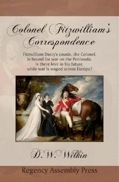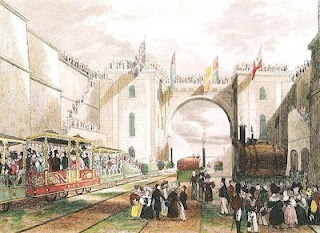Russell Square in the Regency
History
The location of the lord or ladies home in London is always something I spend time over. And each time I then research the square I use or re-research it. I have used Russell Square a few times as well as others.
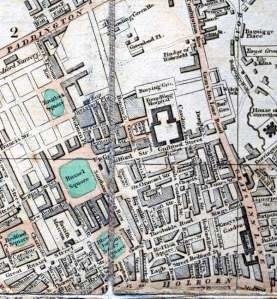
Russell Square is named after the surname of the Dukes of Bedford. The square is on the site of what were the gardens of what was the Duke's London house. The street lamps have the Duke's coat of arms on them. Developed in the very early 1800's by 1808 there seems to be available housing all around the square.
In 2002 the square was re-landscaped to the design of 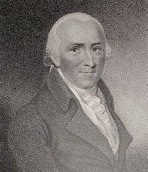 Humphry Repton, regarded as the successor to Capability Brown. Repton lived from 1752 to 1818 so he is one of our Regency Resources.
Humphry Repton, regarded as the successor to Capability Brown. Repton lived from 1752 to 1818 so he is one of our Regency Resources.
Russell Square was designed for Upper and Middle incomes. During the Regency it was home to 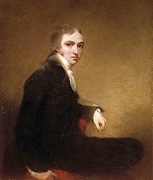 Thomas Lawrence's studio at #67 during the Regency (1805 to 1830). The Lord Chief Justice, Sir Charles Abbott lived on the square during the Regency. Also Sir Arthur Pigott #35, a Whig lawyer, Sir Samuel Romilly #21 who cut his own throat after his wife died. At #3 were the Booth's of Booth's Gin (That has some possibilities for a future story.)
Thomas Lawrence's studio at #67 during the Regency (1805 to 1830). The Lord Chief Justice, Sir Charles Abbott lived on the square during the Regency. Also Sir Arthur Pigott #35, a Whig lawyer, Sir Samuel Romilly #21 who cut his own throat after his wife died. At #3 were the Booth's of Booth's Gin (That has some possibilities for a future story.)
Interview/Giveaway
Once again I was interviewed for my work on Colonel Fitzwilliam's Correspondence.
It was at English Epochs 101 As promised, I am posting the interview here in two parts, but I encourage you all to take a look at Debbie's Page and the rest of her material. During the weekend of the 14th thru 16th of January 2012, she was the leading seller at Amazon of her work, The Companion of Lady Holmeshire 
An Interview with Author David W Wilkin (part 2)
When did you first begin to think about writing a novel, and what motivated your
decision?
As I mentioned, when I left college I got a job right away. But six months later, nepotism and diminishing revenue meant cuts. I was out. So then I turned my hand to a science fiction, a tongue in cheek western, a fantasy. All have potential, but they need another edit based on all that I have learned about the craft. When unemployment ran out, and I only had rejection slips to show for it, I went back into the workforce.
Did you study the Regency when you were at University?
Not at all. I studied a little on the English Victorian era. I had a class on the American Revolutionary era, but otherwise I focused on premodern asian history, and then european, before Napoleon. The Regency era did not hold any interest then. I was college age and a guy. The medieval and renaissance had a lot of battles that appealed to me and the many stories such as King Arthur (whose time period is before the medieval era of course, but all the movies come out with medieval armor and fighting) or Richard Coeur de Lion.
What do you think is the hardest part of writing?
The middle is often hard. To keep everything energized when the Boy is struggling to redeem himself for the Girl, or to capture her interest. I have it plotted but often by the time I get there, secondary plot lines are coming into play and what I had originally glimpsed as interesting when I first thought to write, is now eclipsed by other better ideas. Then the true hard part is editing. Somedays I would rather take a catnap while reading my own words. I of course pretty much remember what they say and where it is going. (Not that I think so highly of my work knowing that it does need editing. But somedays a nap seems very appealing.)
Do you find it easy to choose character and place names
I cheat. I look up in the long list of peerages names and change a thing or two to get them right. Then for place names, I look for an area I want to put the action at, and if it needs to be fictitious I think up something. Using @@@@ford, or @@@@ ton often works. There are a lot of fords and tons in England.
Please tell us about your books.
I'll just talk about the Regencies if that is alright. By far the most popular is Colonel Fitzwilliams Correspondence. It is a sequel to Jane Austen's Pride and Prejudice. Originally I envisioned that the Colonel would emerge and have a romance, but I quickly put Kitty into the scene. With Lydia gone, I found Kitty torn between wanting to be a better young lady, than she had been while her more boisterous sister led her about, but also still a person of fun. I knew that the growth that occurs in all of us over time could be telling for one such as Kitty moving from being a girl to a woman.
I also knew that the war lasts for years, and a woman, if not married before her lover goes to war, most likely would not wait and appear to be on the shelf. When I placed the first letter in the story as a device to appease and contain the ever flighty Mrs. Bennet, I had no realization that would become the device I could employ for the entire story, but the truth is that England was growing closer by virtue of the post. Look to the original and the post between Jane and Lizzy telling of Lydia's flight. Look at the missive Darcy places in the hands of Lizzy to explain himself. There is a great deal of letter writing occurring.
I believe that carries my book. That it is also the change in our hero, who becomes a great correspondent and uses his connections back in England to keep him sane amidst the battlefields of Portugal and Spain. The crux of both his growth, and that of his love interest occurs when he returns from the war. I attempt to place my own use of language, as did Heyer, into the story. I think this is a dividing point for my readers. Some have related that they find this works for them, while others expecting this book to be our current use of language can't get past that.
The last caveat of a work based upon another's writing is that many have their own ideas of what should be happening to the characters the original author created after writing The End. I of course take all those characters in the direction I chose. I used the last few paragraphs as a guideline, and I used Aldous Huxley's view of Pride and Prejudice's Catherine de Bourgh portrayed by Edna May Oliver for mine more than some of the others. Austen says that Lady Catherine and Elizabeth will make amends in the final paragraphs of the novel. The Olivier movie (1940) I think shows that clearly. (Edna May beats Judi Dench in this portrayal, hands down-IMO)
My other two Regencies are a little more of the typical pieces one finds with my twist. I try to emulate as best I can Georgette Heyer. So I don't write to a Harlequin formula but my own. In each I tried to evoke certain parts of the history that is occurring. In The End of the World the location is Cornwall. At this time the first railroad track was laid, without a train, to transport the copper from the mines to the ships that carted it to wales. My fictitious mine is the site where this is first adopted. Not that it plays a central point to the entire tale, but it is there as background. Something our hero brings to the story.
In The Shattered Mirror we have a story that evolves around the true end of the war. It ended twice of course, since Napoleon came back. And when it ends a second time, our heroine, who wants a hero, is going up to Town (London) for her first season. When in Town, she meets, runs into, a man she played with as a child. He, however, is now crippled from an injury sustained in the war. I think that is a side we forget about and I find that most of my heroes have some sort of PTSD. They have seen demons and have to confront them and come to terms with them. I think a great many other heroes in the genre are not beset by such problems. None I have read at least.
Another Interview/Giveaway
I have also been interviewed this week at Laurie's Thoughts and Reviews In the next blog I shall post that here.
The Writing Life
Aside from maintaining communications with the web and internet this week, I worked on my post for English Historical Fiction Authors. The work I shared with the group can be found on line and it is about the research I did for the The Fastest Love on Earth. See it here
Haven't written a great deal of pages this week. Have seen sales for the month reach 38 and of course hoping for more. My Books landing page if you are interested in checking it out and commenting on is at David's Books And feedback here is appreciated.









